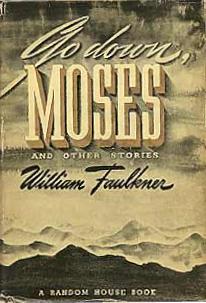This article has multiple issues. Please help improve it or discuss these issues on the talk page. (Learn how and when to remove these messages)
|
 First edition | |
| Author | William Faulkner |
|---|---|
| Language | English |
| Publisher | Random House (US) |
Publication date | 1942 |
| Publication place | United States |
| Media type | Print (hardback) |
| Pages | 383 |
| OCLC | 21562002 |
| 813/.54 20 | |
| LC Class | PS3511.A86 G58 1990 |
| Preceded by | The Hamlet |
| Followed by | Intruder in the Dust |
Go Down, Moses is a 1942 collection of seven related pieces of short fiction by American author William Faulkner, sometimes considered a novel.[1] The most prominent character and unifying voice is that of Isaac McCaslin, "Uncle Ike", who will live to be an old man; "uncle to half a county and father to no one". Though originally published as a short story collection, Faulkner considered the book to be a novel in the same way The Unvanquished is considered a novel. Because of this, most editions no longer print "and other stories" in the title.
The year is about 1859. "Cass" lives with his grand-uncles Theophilus and Amodeus McCaslin, called "Uncle Buck" and "Uncle Buddy" respectively by most of the characters in the book. The story opens with the news that Tomey's Turl, a slave on the McCaslin plantation, has run away. But this is not the first time this has happened and Uncle Buck and Buddy know where he always goes, to Hubert Beauchamp's neighboring plantation to see his love, a slave girl named Tennie. Beauchamp himself has an unmarried sister, Sophonsiba, nicknamed "Sibbey", who seems romantically interested in Buck. Forced to stay the night to look for Tomey's Turl, Buck and Cass accidentally enter Sophonsiba's room, thinking it to be their room. This situation is exploited by Hubert who tries to pressure Buck into marrying Sophonsiba. Buck does not agree to Hubert's exploitive interpretation of events. Buck, Buddy and Hubert settle both their situation and that of Tomey's Turl by tying them to the outcome of a poker match. If Buck loses, he is to marry Sophonsiba and must agree to buy the slave girl Tennie so Turl will stop running away to see her. Buck loses, but coaxes Hubert into allowing another game, Hubert against Buddy, to determine the marriage and property issues. The stakes are changed many times, but in the end Buddy wins and the McCaslins take Tennie for free.
Uncle Buck and Sophonsiba Beauchamp eventually marry and become the parents of Isaac McCaslin, the central character who serves to unify most of the stories in the novel.
"Was" serves to introduce the reader into the practices and mentality of the antebellum South. Where Tomey's Turl is first introduced, he seems to be referred to more as an animal, such as a horse, than a person. When Hubert and Buck are taking bets on where Tomey's Turl will show up, the reader further sees how far removed from human the slaves are in the eyes of the owners. (Faulkner later reveals that Tomey's Turl is Buck and Buddy's half-brother, the son of their father, Lucius Quintus Carothers McCaslin, and his slave Tomey.) Additionally, it is possible Faulkner intends for the entrapping of Buck into marriage with Sophonsiba to be analogous to slavery, although Buck seems to accept it silently.
- ^ "Teaching Faulkner's Go Down, Moses". Southeast Missouri State University. Retrieved 30 April 2024.